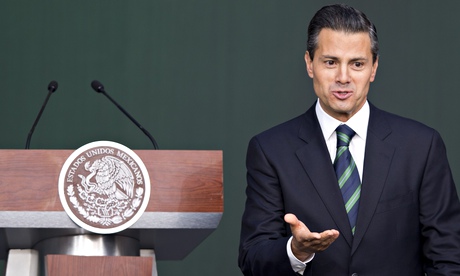In an effort to quell the outcry over the enforced disappearance of 43 student protesters, allegedly murdered on the orders of local officials, Mexico’s President Enrique Peña Nieto has proposed a list of 10 security and justice reforms.
Two key proposals from the list announced on November 27 would remove powers from local security forces, requiring modifications to the constitution.
The first would allow the federal government to take over security in municipalities where there is evidence that local authorities are colluding with organized crime. The second would replace all of the country’s 1,800 municipal police forces with 32 state police commands, and sanction any governors or mayors who fail to comply with this order, reported Milenio. This refers to the “mando unico,” or “unified command” proposed by the president earlier in his term, which has not been fully implemented due to resistance from local authorities.
A third measure aims to better define the responsibilities of various security bodies. The government also plans to deploy federal forces in the conflict-hit southwestern states of Michoacan and Guerrero — the latter is home to the city of Iguala, where the 43 students were disappeared in September.
Four additional reforms address judicial weaknesses and government transparency, including plans to strengthen investigations into enforced disappearances and other human rights abuses.
Other proposals include the creation of a national emergency phone number and a unique ID code for all Mexican citizens.
InSight Crime Analysis
Peña Nieto’s announcements are further evidence that the Iguala case is forcing the government to place the issue of security front and center — something the president has attempted to avoid throughout his term by shifting the emphasis to the economy.
The disappearance of the 43 student protesters has sparked ongoing mass protests, and has brought Mexico’s human rights record under global scrutiny. The case, in which the Iguala mayor was arrested for allegedly ordering attacks on the students by a local criminal group and the municipal police, forced the public to recognize the depths of corruption in Mexico’s local governments and highlighted the broader problem of disappearances.
SEE ALSO: Coverage of Security Policy
However, Peña Nieto’s proposals contain no radical departures from past initiatives. Plans to consolidate the police force have been ongoing for years, while some analysts say this approach fails to address underlying factors contributing to police corruption, such as the lack of will on the part of the government to address the issue. Sending federal forces to take control of security in violence-beseiged states, as practiced by Peña Nieto’s predecessor Felipe Calderon, has often failed to cut violence, and been accompanied by massive human rights violations.

